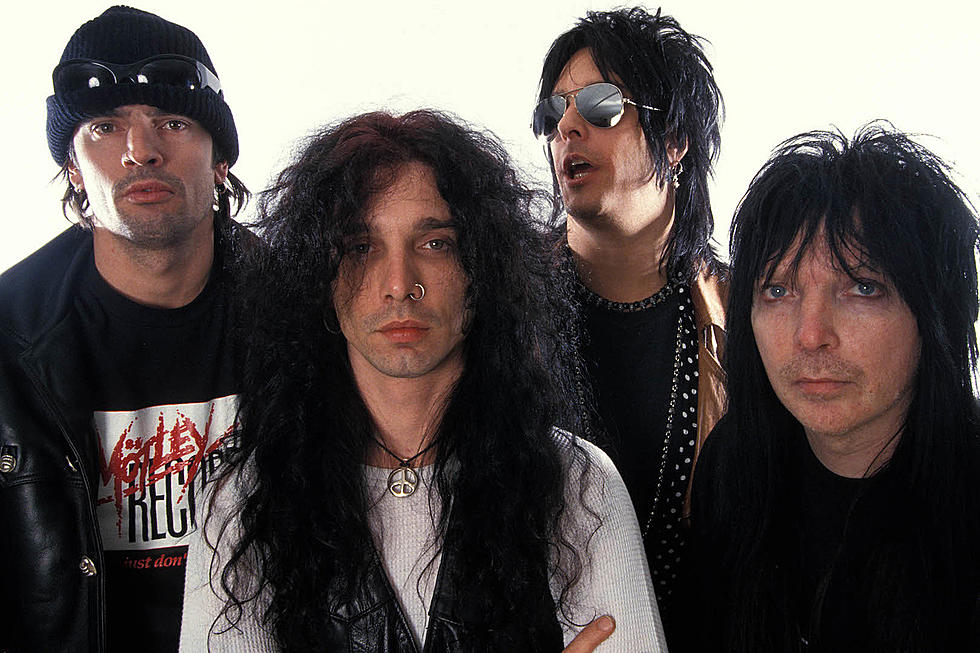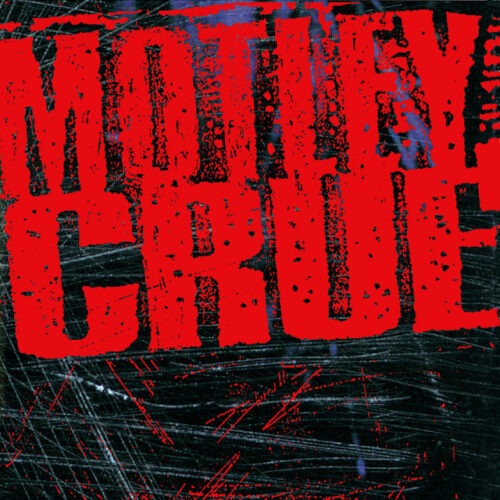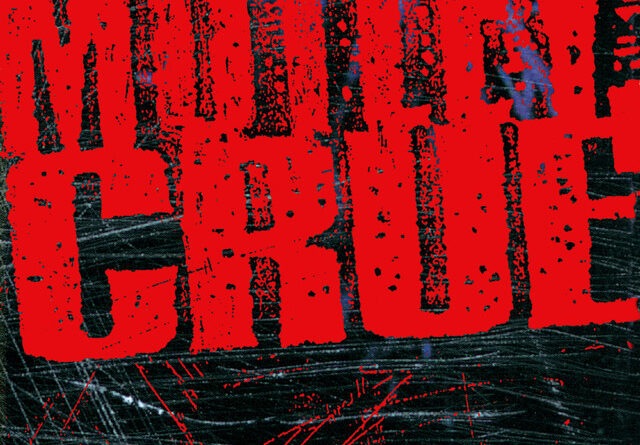HEAVY MUSIC HISTORY: Mötley Crüe – Mötley Crüe
Should a band change their name when there are tectonic shifts in their DNA? Whether it be a complete change in sound or the replacement of a core member, it is something to be considered. Which brings us to the interesting case of MÖTLEY CRÜE’s self-titled record.
Following the success of Dr. Feelgood (1989) and compilation Decade Of Decadence (1991), the most notorious band in the world were facing increasing pressures of touring and the fragility of sobriety. So MÖTLEY CRÜE would do the sensible thing; remove themselves from the situation.
Instead, Vince Neil (vocal), Mick Mars (guitar), Nikki Sixx (bass), and Tommy Lee (drums) would enter the studio. Due to the possibility of tempers fraying, the band worked on a two week on, two week off schedule. However in early 1992, the trio of Sixx, Lee, and Mars would have a catastrophic falling out with Neil. The result of that argument depends on who you ask (as the band’s autobiography The Dirt: Confessions Of The World’s Most Notorious Rock Band would prove) as the trio would state Neil left of his own accord while the vocalist would proclaim he was fired. There are many mysteries to life and this continues to be one of those thirty-plus years later.
Meanwhile, Los Angeles based hard rock act THE SCREAM hadn’t long released their debut Let It Scream (1991). Whilst flicking through an issue of Spin magazine, John Corabi (vocal/guitar) stumbled across an interview Sixx had given and it was full of praise for THE SCREAM. According to the autobiography, Corabi wanted to reach out to Sixx for two reasons; the first to extend his thanks for the compliment, the second being potentially opening the door to discussions with Sixx about the pair collaborating. Following a string of phone calls, Corabi was told to leave his number with Doug Thaler’s (MÖTLEY CRÜE’s manager) secretary so Sixx could contact him. Little did he know, Corabi was about to enter an interesting period of his life.
MÖTLEY CRÜE found themselves without a frontman. This would lead both Sixx and Lee inviting Corabi to audition. After a couple jam sessions, the vocalist would be brought into the fold. The interesting thing to note would be the caveat he couldn’t tell anyone. This was due to pending legal discussions with Elektra possibly wanting to renegotiate their contract because of Neil’s absence.
Before entering the studio with producer Bob Rock, MÖTLEY CRÜE would commit themselves to a crucial requirement: sobriety. Wanting to recreate the success of Dr. Feelgood, the collective agreed to abstain not only from drugs and alcohol but also from red meat, cigarettes, and caffeine. On top of this, the band embraced what Corabi brought to the table with open arms. Sixx would find himself working with another lyricist for the first time while Mars also had a first in playing with another guitarist. This would ultimately be a massive benefit as a total of 24 tracks were written and recorded over ten months under the working title Til Death Do Us Part.
Between the completion of the 24 cuts and release date; MÖTLEY CRÜE would make the bold choice of changing the title of the album to be eponymous. The self-titled nature is something Sixx would later reflect on with comedian Dean Delray stating; “I wish we had called it THE DIRTY DOGS or something, and then whatever happened with THE DIRTY DOGS is that”. Corabi would say to The Rock Brigade that flying the album under the MÖTLEY CRÜE banner wasn’t the band’s idea,“It was the management and everybody that had their hand out that didn’t want us to change the name.”.
Yet MÖTLEY CRÜE took the plunge and released their self-titled effort on March 15, 1994. Fervent fans flocked to the record and were confronted with a barrage of change. On top of Neil’s absence, the album was submerged in smoked whiskey ambience of grunge and alternative metal. MÖTLEY CRÜE wanted to evolve and this was their chance. Instead of sexually charged material, the eponymous album steeped in introspection and observation. The thumping opener Power To The Music reflected on the 1992 Los Angeles riots. The sonic boom of Hooligan’s Holiday was MÖTLEY CRÜE bragging to the world they were still the bad boys with the “iron horse between our legs”. While acoustic led Misunderstood looked into the idea of people letting life pass them by, being encumbered with regret as a result. Arguably the darkest subject matter would come with Uncle Jack, an uncomfortable five and a half minute track about Corabi’s uncle – a convicted child molester. However it wasn’t all subject matter as heavy as the guitars; Smoke The Sky’s “Telling evils of the reefer” is self-explanatory (just because the band had to abstain didn’t mean they couldn’t write about it), while Poison Apples told MÖTLEY CRÜE’s story of “sex, smack, rock, roll, mainline, overdose”.
At the time, reviews were a mixed bag to say the least. Katherine Turman of the LA Times would praise Corabi’s performance for being “meatier and more appealing than predecessor Vince Neil’s”. On the other side of the coin Arion Berger of Rolling Stone would brand the music “samey” whilst stating “Corabi keeps it fresh”. This would unfortunately only set the ball of misfortune rolling.

Promotion is a vital part to anyone’s album cycle. From METALLICA to VENDED, people need to know your album exists. This brings us to a slight lesson in how not to spurn promotion. During an interview with MTV, Nikki Sixx would become disgruntled with a “stupid” line of questioning and threaten to punch the host. This added to backlash from fans and a distinct lack of promotion from Elektra would lead to poor sales. The self-titled would peak at number 7 on the Billboard 200 and number 17 in the UK Album Charts, only for it to quickly slip. As a result, the corresponding tour was scaled back dramatically from stadiums to theatres. This was something the band tried to take into their stride, saying it took them back to the days of Shout At The Devil (1983) and having to adjust their sets around these smaller venues.
The misfortune for John Corabi would ultimately end with his firing from MÖTLEY CRÜE. While the self-titled effort was refreshing, the grunge movement was already starting to flounder and executives wanted to jump from the sinking ship. Whether this was down to the decision of not allowing MÖTLEY CRÜE to change their name will remain an uncertainty. But label executives are a law unto themselves and Elektra simply wanted Vince Neil back. Though as Generation Swine (1997) went to show, the problems weren’t purely at one person’s door.
Corabi found himself in the position of taking this material with him. He would go on to release Live 94 (One Night In Nashville), a live rendition of the album in its entirety in 2018. An interesting point comes from Ultimate Classic Rock in a retrospective; “if it weren’t for Corabi’s solo performances, the material would likely have been forgotten entirely.”.
With the yellow variant of the cover long since out of print and no real acknowledgement from MÖTLEY CRÜE in the years since, bar an Instagram post made by Tommy Lee, the album has faded into obscurity. There are ardent fans who will happily die on the hill of this being the best album in MÖTLEY CRÜE’s history. While others choose to ignore it altogether because “it’s not MÖTLEY CRÜE without Vince”. It simply goes to show there is a lot in a name and as a result this album has not had the legacy it sorely deserves.

Mötley Crüe was originally released on March 15, 1994 via Elektra.
Like MÖTLEY CRÜE on Facebook.

